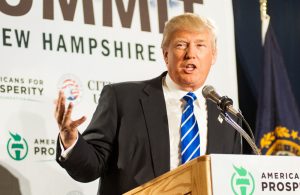Gradually, America and the rest of the world are coming to terms with Donald Trump’s political ambitions. Even the Huffington Post, which initially dismissed the New York billionaire’s bid for office as a clownish “sideshow,” is now openly warning about a supposedly disturbing political development that has “curdled and congealed into something repellent and threatening.”
The real estate mogul has gobbled up one state after the other in the Republican presidential primaries, placing himself in a strong position to become the party’s standard-bearer in the upcoming elections. The Republican establishment is in a state of panic, but so far it has failed to rally around an alternative candidate. More moderate candidates such as Marco Rubio, who performed dismally in the Super Tuesday primaries, are hanging by a thread. He is even expected to lose in his home state of Florida. Only Ted Cruz, the firebrand Texan senator, has emerged as a viable contender. But, he is even more reviled by the Republican establishment, who bemoan his ideological obstinacy and almost-zero collegiality.
For sure, the prospect of a Trump presidency is far from assured. Even if he manages to win his party nomination, he is expected to lose in a head-to-head clash with any of the two Democratic candidates. Nevertheless, the very fact that a person like Trump, who has walked from one scandal into another, is now considered as a serious contender for the White House says a lot about the decay of American democracy, rise of authoritarianism, and Washington’s increasingly dysfunctional politics.
Throughout Asia, both governments and ordinary citizens have been anxiously witnessing the bewildering rise of Trump, whose venomous rhetoric and outrageous policy pronouncements are, by all means, a major threat to American credibility. More than the rise of China, Trump — and the form of politics than he represents — is the greatest threat to American leadership in Asia.
As leading political scientists have discovered, the ascent of Trump is a symptom of a greater problem: That is to say, rising xenophobia and ‘activation’ of authoritarian tendencies among certain sections of the electorate. As an astute salesman, Trump has opportunistically tapped into an increasingly mobilized constituency, one that is inspired by outrage over economic dislocation and fear vis-à-vis “the other”, whether (Catholic) Mexicans crossing the border or (Asian) Muslims entering the United States.
Almost single-handedly, Trump has made ‘political correctness’ an ideological battle, while mainstreaming what would be normally considered as outright bigotry. Shortly after the San Bernardino attacks, the New York billionaire called for an outright ban, albeit temporarily, on entry of Muslims to the country. He tried to justify it as a reasonable precaution, but ended up totally ignoring the implication of his abhorrent proposal — that Muslims, as a whole, are potential security threats to Americans.
His statements provoked outrage in parts of Asia, where the bulk of the world’s Muslim population resides. Malaysia’s deputy home minister Nur Jazlan Mohamad lamented, “[Trump’s] proposal reflects the thinking of many people in America, and this is worrying.” In Indonesia, the world’s largest Muslim-majority country, a top Indonesian lawmaker, Setya Novanto, was charged with breach of ethical conduct when he dared to attend one of Trump’s campaign events in New York.
As astute observes such as Joseph Nye have argued, the United States’ global leadership isn’t only a function of its military might and economic prowess. The attraction of its values, the durability of institutions, and the resonance of popular culture act as ‘force multipliers’, allowing America to rely more on persuasion rather than coercion in its international dealings.
But Trump and his brand of politics make a mockery out of America’s claim to exceptionalism. Aside from charges of bigotry, the real estate mogul has also been described as an isolationist, who is interested in reviving 19th century American mercantilism. He has opposed free trade, lambasted key allies such as Japan as free-riders, proposed the extraction of imperial tributes from South Korea, and, quite astonishingly, implicitly praised China’s sweeping reclamation activities across adjacent waters.
As Thomas Wright of the Brookings Institution put it, Trump is intent on upending the international liberal order by advocating “high-tariff protectionism and every-country-for-itself mercantilism.” In this sense, Trump’s worldview is a complete departure from the bipartisan consensus that has governed American foreign policy since the end of World War II.
No wonder then, leading conservative pundits such as Max Boot have openly (and heretically) suggested that they would rather vote for Hillary Clinton than the presumptive Republican standard-bearer. “I would hope that the [Republican] party would fracture if the nominee were a fascist demagogue like Donald Trump,” Boot bluntly declared. Robert Kagan went so far as describing Trump as the Republican Party’s “Frankenstein’s monster.”
Trump combines fear-mongering at home with irresponsible isolationism abroad. The Obama administration made America’s engagement with Asia a centerpiece of his foreign policy. And yet, his much-touted “pivot to Asia” policy has been hobbled by lingering doubts over America’s ability to get its own house in order as well as its wherewithal to rein in Chinese territorial assertiveness in East Asia. The Trump phenomenon simply exacerbates this conundrum.
Whether he wins the presidency or not, Trump has severely undermined America’s image in the eyes of the world. And a Trump presidency, without a doubt, would surely be a disaster, perhaps even encouraging some American partners and regional fence-sitters to quietly defect to China.
Richard J. Heydarian teaches political science at De La Salle University, the Philippines, and is the author of Asia’s New Battlefield: The US, China, and the Struggle for Western Pacific (Zed, London).

































